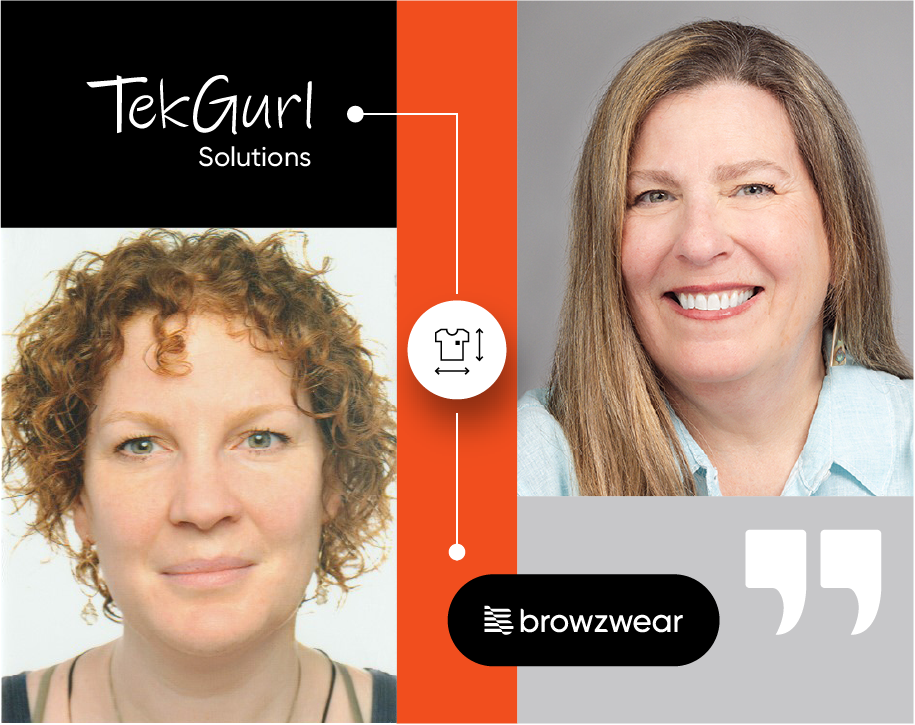How to Integrate Fashion PLM with 3D Clothing Design Software
Learn how to integrate fashion PLM with 3D design software to streamline workflows, boost collaboration, and speed up product development.
June 10, 2025

At TekGurl Solutions, innovation meets craftsmanship. With over 30 years of experience in product design, patternmaking, and production, TekGurl is a boutique consulting powerhouse that helps fashion brands optimize fit, streamline development, and embrace the latest fashion product development software.
Led by seasoned technical experts Eileen and Susanne, TekGurl brings deep knowledge across all apparel categories—from swimwear and outerwear to activewear, menswear, and even pet apparel. They aim to spark creativity, fuel innovation, and bring ideas to life using cutting-edge technology and sustainable practices.
Eileen’s journey began at age 11, when she began sewing her own clothes and reimagining store-bought patterns. After earning a degree in fashion design, she started as a swimwear patternmaker and designer. Over time, her technical skills became her superpower. For the last 8+ years, she has brought designers’ visions to life through patternmaking and virtual prototyping. She’s worked across product types and size categories, including men’s, women’s, children’s, and infants.
Susanne started her career in Germany, sewing costumes for medieval festivals before pursuing a formal tailoring and patternmaking apprenticeship. After advanced training, she entered the outdoor apparel space, creating technical garments with over 100 pattern pieces. She’s worked with small brands and industry leaders like Adidas and now partners with Eileen at TekGurl, specializing in performance wear and outerwear.

Rays Suit virtual twin, developed by TekGurl, and its physical garment
At TekGurl, Browzwear’s VStitcher is the core engine powering digital workflows. Almost every pattern created goes into Browzwear, whether for client review or internal validation. Patterns are typically created in Gerber and imported into VStitcher, where the team tests fit, visualizes design execution, and runs size validations using Alvanon avatars.
Eileen emphasizes how VStitcher enables speed and precision:
“Being able to see a product come to life without waiting for a physical sample is integral to our success. We check pressure and strain maps to ensure proper ease, test fabrics, and even validate grading intervals before releasing patterns to clients.”
Susanne adds:
“For outdoor garments with complex cutlines, 3D is my lifeline. I use VStitcher to test pattern shapes, inspect seam placement under the arm, and refine every detail, live on a call with a designer. That saves weeks in prototyping and reduces our carbon footprint.”
Whether creating polo shirts, rain jackets, fishing bibs, or digitally dressing pets, TekGurl relies on Browzwear to eliminate guesswork and bring products closer to production-ready, faster and more sustainably.

Clubhouse Polo virtual twin, developed by TekGurl, and its physical garment
Both Eileen and Susanne agree: VStitcher stands apart for its usability, accuracy, and functionality.
Intuitive interface: “I get VStitcher,” says Susanne. “It just makes sense. The layout is user-friendly and the tools feel natural.”
Fit validation tools: Pressure maps, transparent fabric views, and layering features allow them to simulate real-life garment conditions and improve accuracy.
Seamless grading: The team often tests size ranges directly in VStitcher, adjusting grading on the fly to ensure fit consistency.
Fabric accuracy: With firsthand experience using the Browzwear Fabric Analyzer, they trust the simulation to represent material properties accurately.
Efficiency: VStitcher’s colorways, snapshot features, and cloud rendering capabilities keep TekGurl’s workflow fast, flexible, and scalable.
“While having beautiful renders is a plus, we need functionality, and Browzwear delivers that,” says Susanne.
Even clients who were initially hesitant about 3D now request virtual prototypes after experiencing improved fit and fewer rounds of physical sampling.

As sustainability and speed become top priorities for fashion brands, TekGurl believes that product development tools like Browzwear will play a leading role. However, they caution against over-reliance on automation without expertise.
“Technology should enhance your skills - not replace them,” says Eileen. “AI can’t fix bad pattern balance or poor construction logic. VStitcher has made me a better patternmaker because I can see how updates impact fit in real time.”
Susanne agrees:
“3D sharpens your skill set. You can test 50 versions in 3D for the cost of almost nothing. That’s smart and sustainable. AI may help, but it’s only as good as the person using it - and right now, it needs us to feed it.”
They both see AI as a tool with potential but also limits. Without technical guidance, it could generate unwearable designs or create more waste. Used responsibly, however, it can support faster, smarter product development.
“We still need people who understand fit,” says Eileen. “Eventually, even the most AI-driven workflow will need a specialist to make it work.”
At TekGurl Solutions, the combination of deep technical mastery and Browzwear’s product development platform allows clients to move from concept to creation with unmatched precision, speed, and sustainability. Together, they are shaping the future of digital product development, one well-fitted garment at a time.
Learn how to integrate fashion PLM with 3D design software to streamline workflows, boost collaboration, and speed up product development.
Explore fashion product development stages, roles, and technology advancements, transforming ideas into market-ready products efficiently and...
Shift from linear to circular product development to boost speed, reduce waste, and build a more agile, sustainable fashion supply chain.